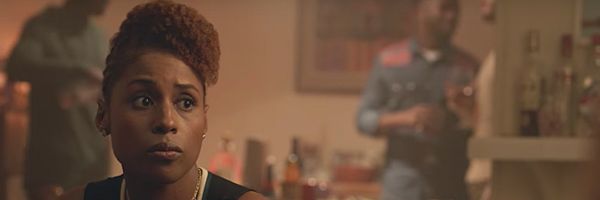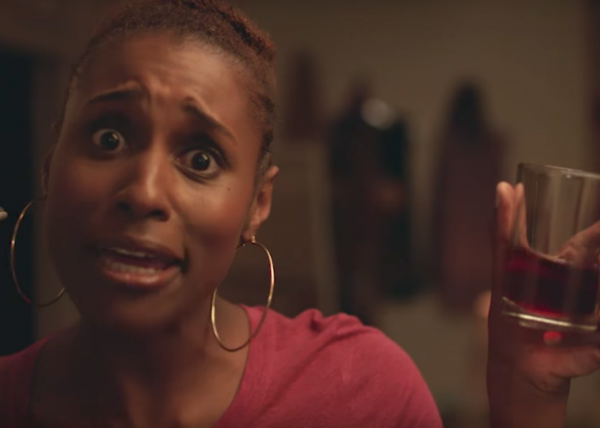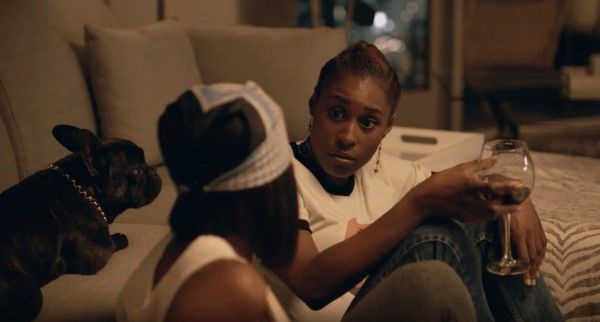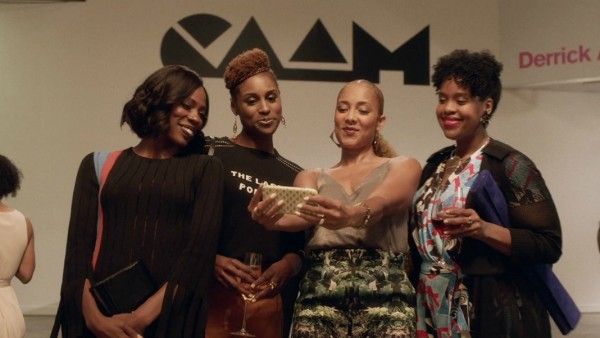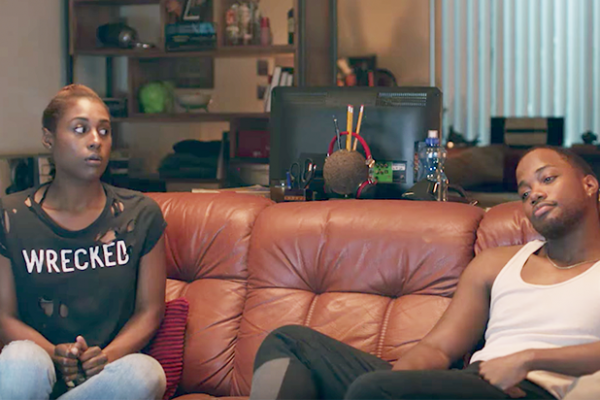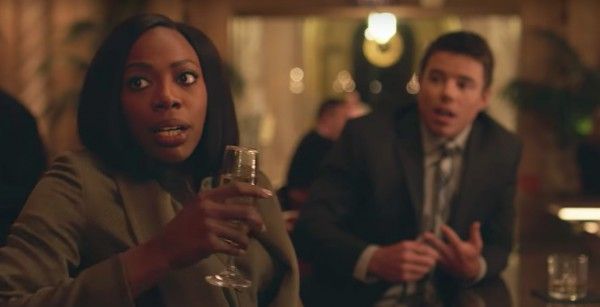When not name-dropping Ava DuVernay or hooking up ramshackle sound-systems to blast Kendrick Lamar's "DNA" in the park, the denizens of Issa Rae's Los Angeles in Insecure often indulge in one particular race-driven period melodrama on TV. In the show, Regina Hall plays a slave who carries on an illicit affair with her master (Scott Foley). In one scene, they plan a clandestine rendezvous; in another, she is getting scolded for learning how to read by the lady of the house. It's tawdry, obvious, manipulative, and clearly very popular.
The show is a reflection of black narratives in popular media, most pointedly the fact that the issue of dealing with race is often used as window dressing to spruce up tired, familiar soap-opera conflicts. In the brief clips we see of Hall and Foley's show, sex and restrained self-improvement becomes the most potent aspects of the drama with the uglier side of the Antebellum days and the realities of being black spelled out in big, rote terms without nuance or a sense of inner life for the characters involved. Rae fixes that last bit for her series, showcasing a range of experiences, opinions, and sublime, quiet moments of reflection, but doesn't look so inward as to not be funny or know the power of a thoughtful climactic pay-off. One can see as much Girls or Queen Sugar in Insecure as one can see Living Single or Laverne & Shirley.
This is not meant as a knock. One of Insecure's greatest charms is that there is a familiarity to the material, a sense that Rae and co-creator Larry Wilmore, he of the sadly defunct Nightly Show, have a vast knowledge of romantic comedies, sitcoms, and the joys and perils of courtship. Toward the beginning of the second season, there is a familiar montage of awkward dates, followed by quite a lot of time devoted to Issa's rocky relationship with her on-again-off-again boyfriend Lawrence (Jay Ellis). There's even a trying-on-dresses montage before a doomed party and a classic too-perfect date between Issa's best friend, Molly (Yvonne Orji), and a handsome marketing guru, played by Sterling K. Brown.
All of this is done with the customary wit that has quickly become synonymous with both Rae and Willmore, and there's a shared emphasis on linking the humor to the present. At a gallery opening, Rae raps into the bathroom mirror to expel some shock over finding out Lawrence is seeing Tasha (Dominique Perry), just before breaking down and obsessing over her Instagram feed. "She looks like she's working at the pyramid tonight," one of Issa's friends comments, distorting an empathetic Frank Ocean line into a cold, unwarranted judgement of her appearance. And yet, neither Perry nor Rae allow Tasha to be dismissed as a cypher without feelings conjured just to help move along the narrative, and her interactions with Lawrence range from thrillingly lustful to alarmingly domestic to genuinely moving.
For all the guffaws Rae, Willmore, and their creative team score here, and there are plenty to be had, their belief in romantic comedies reaches back toward its origins in the comedies of Preston Sturges, Ernst Lubitsch, Leo McCarey, and Howard Hawks, to when comedies were rife with modern societal issues. One can still see this in a scant examples of modern comedies - The Big Sick comes to mind - but it flows regularly in Rae's series. The dreaded gig economy, finding and supporting your communities, the regular complications and false starts in non-profit work, black promotion at classically white offices, and, yes, even the President are studied within the confrontations and confessions that Rae lays out.
In one storyline, Frieda (Lisa Joyce), Issa's partner at We Got Y'all, begins to feel uncomfortable with the level of racism expressed by an otherwise friendly principal at a school, an issue which Issa shows only a passing concern toward. The principal goes as far as to half-jokingly show support for Trump's border wall. It's too good to spoil just how knotty this gets but confrontational yet mindful set-ups like this yield some of the show's most rousing scenes and unexpected insights into political correctness, bigotry, and the limitations of righteousness in Insecure. Similarly, the second season's deliberate focus on finding and keeping up with work that is fulfilling without being too morally compromising gives potent stakes to Issa, Molly, and Lawrence's lives, and Rae rightly makes the connection between professional and social frustrations or faults palpably clear.
Visually, Rae and her directors continue to hone a cozy, intimate view of the various neighborhoods of Los Angeles, and the hazy yet picturesque veneers perfectly fits the worldview of a generation that starts and maintains a great deal of their most intimate relationships through texts, DMs, and picture posts. Rae isn't amazed by and dependent on the new world of technology the way that Aziz Ansari is in his excellent Master of None; she's already over their deflated promise. Unlike so many sitcoms that wait months to confront popular culture trends, Insecure is alive and engaged in the time after Tinder was new and fun, when you realize that bad luck in love and dreaded dry spells are often caused from within and politics are unbearably personal. It also happens to be a show that most fans of Living Single or Laverne & Shirley would probably love.
Rating:★★★★
Insecure airs on HBO on Sunday nights at 10 p.m. starting July 23rd.

